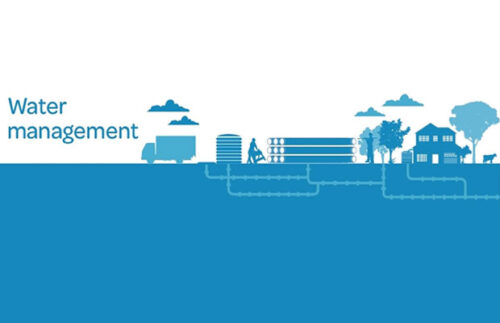
Without water, most of the companies and the products that they provide would fail to exist. Water is a fundamental commodity for nearly every step of the manufacturing and production processes in all industries around the world. Whether it is deionised water for electronics and pharmaceutical sectors, or softened water for boiler feed applications, water is necessary for all industrial sectors. And to put it into perspective:
Industry accounts for about 40% of total water abstractions!
Yet, at the same time, many global companies have manufacturing facilities operating in water scarce parts of the world. With over 2/3rd of companies now reporting exposure to water risks, efficient water management is critical to the operation of any industrial plant. Under inadequate control, the water system can create significant difficulty to the plant like Loss of production capacity, increased cost of cleaning, reduction in production numbers, increased energy Maintenance costs and reduction in service life.
Knowing the fact that water is used intensively by various industrial sectors, the increasing water demand and the effects of climate change are leading to overuse of water resources in many sectors. In the current scenario, water scarcity is a fact due to: (a) Highly urbanized and industrialized regions with high demands of water; and (b) Complete deterioration of water sources. The necessity of development of new water management systems in industries to minimize and overcome un-sustainable industrial practices is highly evident.
The underlying issue that already persists –
By 2030, according to NITI Aayog report submitted in June 2018, the country’s water demand is projected to be twice the available supply, implying severe water scarcity for hundreds of millions and an eventual loss of around 6% of India’s total GDP. The industrial sector is partially responsible for this situation of water-related constraints. The industry itself is bound to suffer in terms of availability of water, quality of water, the impact of scarcity on process control and cost of water.
In this perspective Waste/Effluent water treatment, Water Harvesting, Reducing Water Consumption, Reusing of Water & Recycling of Water etc, is of utmost importance to solve water problem in all facets of life, including industry, domestic and agriculture.
What can be done?
While it is generally accepted that improvements in water management are required worldwide, the relatively low apparent financial cost of water is inhibiting the essential changes. In most of the industrial sectors, a common trend is identified, whereby the actual cost of water is rarely determined and hence unappreciated. In order to remedy this situation within industry, a framework for establishing the actual cost of water by analysing the value added could provide valuable insights into the operation of the facility, which provides a means for internal and external benchmarking and internal cost control, and also the data necessary to financially justify any modifications required.
One strategy to meet these challenges is to implement an industrial water management solution to monitor and control water consumption in the industrial sector. The development of new concepts and technical, digital, and nontechnical innovations together with priorities have already set the course for future integrated smart water management.
Building a sustainable water management solution for industrial sector
Today, Industrial water management is a very critical component of sustainable development. The rational use of water and reducing water wastage (through leaks or other forms), need to be considered as the basics for any solution for sustainable and integrated water management to be implemented in an industrial sector. Managing supply and demand is the most important thing in building a sustainable water network, and IoT based smart applications are uniquely well-suited to address this exact issue.
A sustainable smart water management and monitoring system is capable of monitoring leakage detection in real-time. Also, these help in increasing the quality of water, detecting real-time leakages, managing water consumption by using sensors and other devices. These systems help users by providing input to know the critical factors. These factors include real-time water pressure, water levels, the flow of water and many such factors.
Holistic and continuous data from IoT based water management systems can unlock insights regarding supply and demand of water, allowing water managers in industrial sector to make evidence-based decisions that span beyond the reach of their plant. These evidence-based decisions will determine how cities rezone neighbourhoods, determine water pricing, and invest in infrastructure that will enable them to fulfil both short and long-term water management goals.
Role of IoT based smart water management system in the Industrial Sector
IoT (Internet of Things) systems enable data to be collected in any aspect of a smart water system that can be measured with sensors. Typically, the data is then stored on a “cloud” and is available to the water manager by logging into a software platform on any device with a web browser. Additionally, data about water can provide interesting insights which can help determine predictive maintenance of pumps, distribution networks, or storage levels. Through these types of solutions, water managers can gain the ability to repair breaks within a smart water system, even before incidents occur, saving capital and material cost and increasing ROI. Real time insights about water usage in industries save energy costs, improves operations and processes, lowers infrastructure cost and requires less or no human intervention. Using IoT, the usage of water gets reduced and hence organizations earn more and high-end revenues.

IoT based water sensors provide data that helps in the real-time tracking of all the assets performing their tasks. For instance, theft and other related activities that occur in the end-to-end processes like tanker lorry management etc. Analytics about the Internet of Things helps to manage different irregularities as well. Also, it provides users with a real picture so that they can make more intelligent decisions for industries.
Industries that use smart senor technology for water management get real-time data that can drive or automate decisions, reduce costs and waste less resources. According to a research study, an average industrial plant can save up to 20% of its energy use through installation of smart technologies and bring down water consumption by up to 30% saving water in leaks and monitoring over-usage areas. Data collected with smart water devices is being integrated to show how much water is being used at different areas of the industrial plant and how can one target areas where they can use water more efficiently. Using the data produced by sensors, industrial operations at various water supply chains receive key insights to change conditions of water resources and equipment and help take data-driven corrective measures on demand.
Smart meters and monitoring hubs allow real-time water consumption measuring, help identify overly excessive usage and waste points, provide correct usage patterns and make predictions for future consumption. Using smart meters and consumption monitoring tools can correct water consumption routines and reach sustainability and budgeting goals in the industrial sector.
IoT based systems bring about different advantages to the elements present in the industry. In short, it provides a new way that can help in collecting data, keeping a check and problem-solving. IoT has already created new ways for other elements to stay active in different industries and now it is one of the most exciting times for IoT to get into action and bring about a drastic change in water management in the industrial sector.

